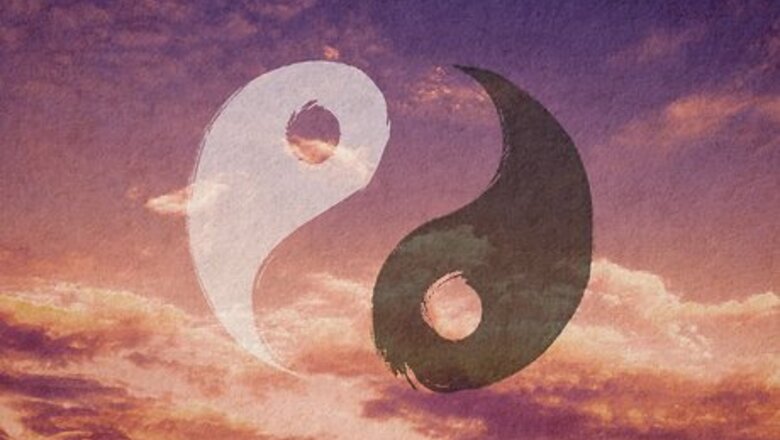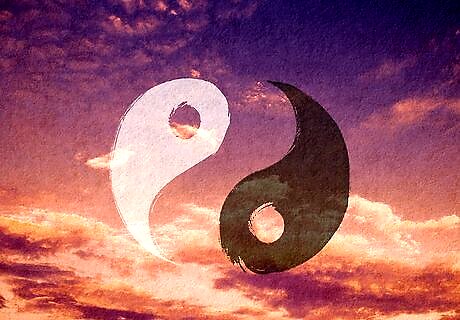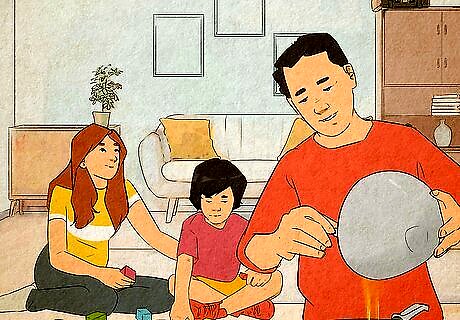
views
- Yin (“feminine” energy) and yang (“masculine” energy) are present in everyone, and when balanced, they promote peace and harmony in a romantic relationship.
- A couple with balanced yin and yang energy listens and supports each other equally, ebbing and flowing from these roles depending on their needs.
- Balance your couple’s yin and yang energy by leaning on your partner, offering support, communicating openly and honestly, and embracing your individuality.
Yin vs. Yang Energy

Taoist philosophy divides chi (energy) into equal but opposite halves. The female energy (yin) and the male energy (yang) work together to balance each other out, leading to a harmonious, healthy relationship. Yin and yang can fluctuate between partners, meaning a partner with more yang energy can shift to having more yin energy and vice versa. Yin and yang are not stagnant and are always changing. Regardless of the gender you identify with, everyone has both yin (“feminine”) and yang (“masculine”) energies constantly ebbing and flowing within them. Yin and yang are equal opposites, meaning that one is no better than the other.

Yin energy typically represents softness, feeling, and obedience. People with prominently yin energy are often passive, laid back, and relatively quiet in social settings. These nurturing souls tend to enjoy solitude, spending time with those closest to them, and creating a safe space for themselves and others in their home. Those with primarily yin energy can also be too reliant on their partner to do more actionable tasks such as handling finances, disciplining their children, or maintaining their sexual relationship.

Yang energy typically represents hardness, thinking, and assertiveness. These go-getters aren’t afraid to advocate for themselves and are frequently on the move. Often very high-energy, people with more yang energy are extremely motivated and tend to take on lots of responsibility in any environment they enter, such as at work and at home. People with dominant yang energy may have difficulty relaxing or accepting support from others, leading to burnout and internalized anxieties.
Yin and Yang in Relationships

Balanced yin-yang relationships are harmonious and equal. While yin energy promotes listening, receiving, and accepting support from their partner, yang energy promotes speaking, instigating, and giving. Couples in control of their yin and yang energy work together as a team to navigate their constantly fluctuating chi energies. This means accepting and giving support when necessary and maintaining a balanced amount of responsibilities between the pair. For example, couples with balanced yin and yang energy both make an effort to manage the home, parent their children, and initiate a healthy sex life. When both couple members feel supported and have different but equal responsibilities depending on their yin/yang energy levels at the time, their relationship has plenty of room to flourish into something wonderful.

Too much yang in a couple can lead to a domineering relationship. If one person has too much yang energy, while the other is balanced or yin-leaning, the person with too much yang will try to dominate and rule over their partner by attempting to control them. Alternatively, if both partners have too much yang energy, they will both struggle for power in their relationship and look for ways to undermine the other. A yang person depending on a yin person and vice versa can lead to a codependent relationship, where both partners feel empty without the other.

Too much yin in a couple may lead to complacency. If one partner is more yin-leaning, they may overwhelm their yang or balanced chi partner by constantly relying on them to uphold more actionable aspects of their relationship, such as decision-making and planning. Alternatively, if both partners have too much yin, they’ll likely avoid instigating a sexual relationship with each other. Too little yin can also lead to a lack of creativity and drive to expand the horizons of their relationship by trying new things rather than staying stagnant.
Yin Yang Relationship & Sex

Balance and connection with your partner are key to a healthy sex life. When both members of a romantic partnership are in harmony with their yin and yang energies, they can better initiate and receive sexual energy. Instead of feeling neglected or overly sexual, equal yin and yang energy in a couple leads to a magical middle ground where both partners feel confident expressing their sexuality freely, ensuring their needs are met. Yin (“feminine” energy) moistens and cools bodily functions. Yin energy prompts people to want to receive sexual energy from their partner. Yang (“masculine” energy) warms and activates bodily functions. Yang energy makes a person want to initiate sexual energy.

Out-of-balance couples may lack sex drive and confidence. A partner lacking yin energy may struggle with self-worth issues limiting their confidence in bed, while a partner lacking yang energy may feel burnt out and lack sex drive. When either partner lacks the confidence or energy to be sexual, they risk becoming distant from each other, which can lead to problems in their relationship. For example, a couple with their yin and yang out of balance may find themselves putting off sex because they’re too tired or don’t feel sexy in their skin.
Balancing Your Yin & Yang Energies

Communicate openly and honestly with your partner. Being aware of your partner’s physical and emotional needs and your own makes you better able to solve problems. When both partners feel listened to and supported, their yin and yang energies work in harmony to resolve before they build into something that could become damaging to their relationship. What to Do: Make time to communicate openly and honestly with each other everyday. Whether it’s discussing what’s been on your mind over dinner or listening to your partner vent before bed, you’re promoting healthy interdependence (the ability to need and be needed by your partner). Listening is a key characteristic of yin energy while vocalizing your needs is a key characteristic of yang energy. When both partners listen to each other’s needs sexually and emotionally, they can achieve equilibrium and harmony.

Accept and give support to your partner freely. A couple where one partner constantly gives support but doesn’t get any back is often doomed to fail. Alternatively, when a couple feels comfortable leaning on each other equally, no one's needs are overlooked. What to Do: Reach out to your partner when you’re in need of support, and let them know they can come to you to do the same. It’s critical that both partners know that asking for help or showing their vulnerable side isn’t a sign of weakness but strength. Wearing feng shui colors such as green and orange, or decorating your bedroom according to Feng shui principles may help to bring balance to your couple and home!

Express yourself authentically. The more you stay true to yourself by embracing your own needs and wants, the more you balance your yin and yang energies. Being in a healthy relationship doesn’t mean melting into the same person; it means pursuing your own interests and supporting your partner to do the same. This keeps your relationship in flux and stops it from becoming stagnant or boring. What to Do: Have fun exploring new passions, like taking a pottery class or picking up a new sport like tennis. With you and your partner taking on new and exciting activities, you’ll have plenty to discuss! Feng shui sounds, such as wind chimes, may help balance you and your partner’s chi.

Practice yoga. Not only is yoga a great way to stay in shape, but it’s also an excellent way to balance your yin and yang energy. Yoga synchronizes your mind and body, allowing your yin and yang energies to flow equally. What to Do: Take a beginner’s yoga class with your partner. Sharing this activity with your significant other will help you to bond and balance your chi simultaneously—it’s a win-win! Taking couple’s sound bath is another fabulous way to balance you and your partner’s yin and yang energies at the same time.


















Comments
0 comment